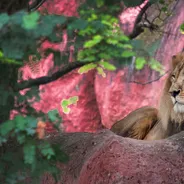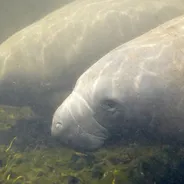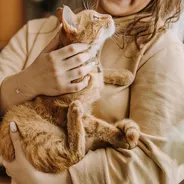The debate about palm oil has snowballed over the last few months. The purchase of cheap food and cosmetics necessitates the production of palm oil which, in turn, requires millions of acres of land with a very specific climate.
In an enormous cyclical game of “pass the buck”, consumers blame multinationals who blame suppliers who blame farmers who - completing the circle - blame the consumers. However, somewhere in this mess was an endangered Bornean orangutan called Pony.
In the village of Kareng Pangi in Central Kalimantan, Pony was kept against her will for the purposes of deriving sexual pleasure. Her “clients” were generally palm oil farmers who would pay her captors the equivalent of $2.50 to visit her.

“If a man walked near her, she would turn herself around, present herself, and start gyrating and going through the motions,” Director of the Borneo Orangutan Survival Foundation Michelle Desilets told VICE. “She was being used as a sex slave. She was probably about six or seven years old when we rescued her, but she had been held captive by a madam for a long time. The madam refused to give up the animal because everyone loved Pony and she was a big part of their income. They also thought Pony was lucky, as she would pick winning lottery numbers.”
Pony was humanised with jewellery and make-up but it was the unusual experience of a sexual encounter with an orangutan which kept punters coming. “You could choose a human if you preferred,” states Desilets, “but it was a novelty for many of the men to have sex with an orangutan. They shaved her every other day, which meant that her skin had all these pimples and was very irritated. The mosquitoes would get to her very badly and the bites would become septic and be very infected, as she would scratch them constantly. They would put rings and necklaces on her. She was absolutely hideous to look at.”

Found lying on a mattress and chained to a wall, Pony was discovered in February 2003. However, in a remote part of Borneo where the locals are resistant to outsiders’ intervention, it would be a long time before she was released.
“It took us over a year to rescue her,” Desilets explains, “because every time we went in with forest police and local officers we would be overpowered by the villagers, who simply would not give her up. They would threaten us with guns and knives with poison on them. In the end it took 35 policemen armed with AK-47s and other weaponry going in there and demanding that they hand over Pony. It was filmed by a local television crew and in the background of the film when we are unchaining Pony you can hear the madam crying hysterically, screaming, ‘They are taking my baby, you can’t do this!’ There is no law enforcement in Indonesia so these people didn’t face any sentence or anything for what they had done.”

Pony’s plight has been making headlines again recently as the issue of deforestation for palm oil plantations is on the minds of many consumers. British supermarket Iceland released a touching orangutan-based video which has clocked up millions of views online.
The video was angled as a banned advert, which perhaps drew more attention from those on social media. Focussing on palm oil, which the chain has removed from its own-brand products, the animated short was deemed too political to be a television advert. However, it was actually banned when it belonged to environmental charity Greenpeace, before it was sold to Iceland.
Palm oil is used in a range of products including chocolate, toothpaste, shampoo and detergent. The climate required to support palm oil plantations already supports a breadth of life. Indonesia, for example, is home to 15 per cent of all species of plants, mammals and birds. Yet the Indonesian rainforest is being destroyed to make way for palm oil.
While this is certainly an upsetting story, where Pony is concerned, it does have a happy ending. She now lives in Nyaru Menteng Rehabilitation Centre, along with seven other critically endangered primates. “Living for so long with humans and being treated so appallingly whilst in captivity, it was not easy for Pony to learn to live as a wild orangutan,” explains Monterado Fridman, the sanctuary's Communication and Education Coordinator. “Pony has been going through a long process of rehabilitation to forget her ordeal and regain her wild nature to become a true orangutan.”

Clearly, though we tend to assume that all people have a level of respect for wildlife, there are still those for whom animals are unthinking and expendable. As the conversation about conservation continues, let’s hope humanity can take a few steps back - away from orangutans’ habitat.
You can donate to Borneo Orangutan Survival Foundation on their website and sign your name on Greenpeace's petition for corporations to drop palm oil for free












